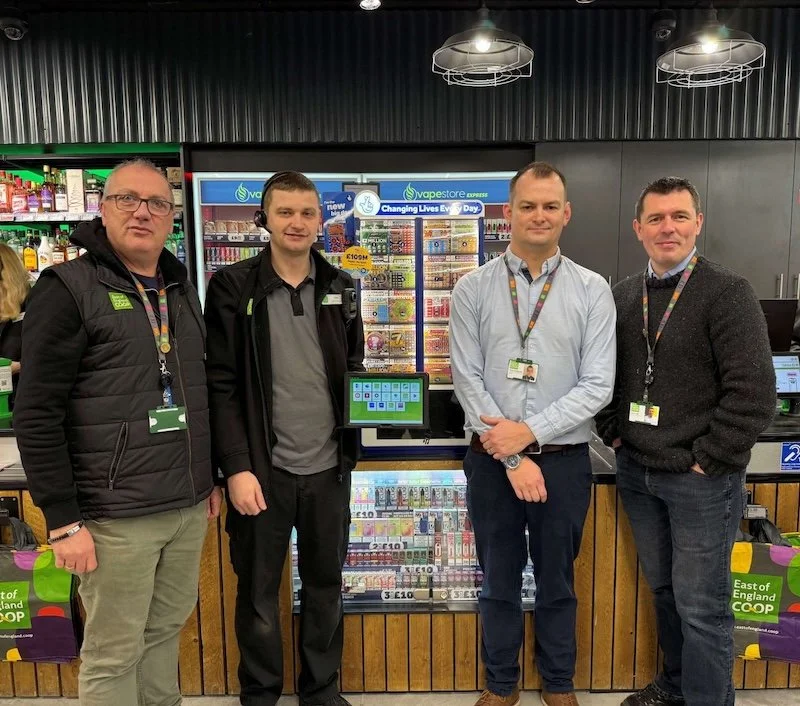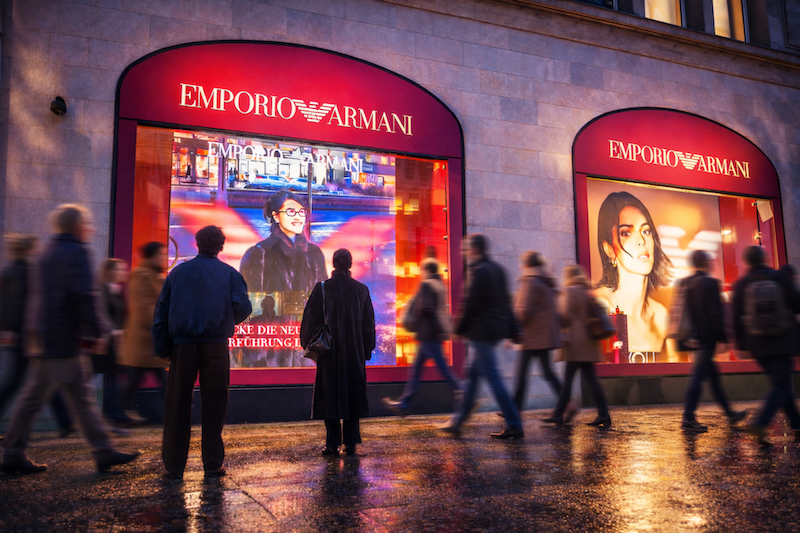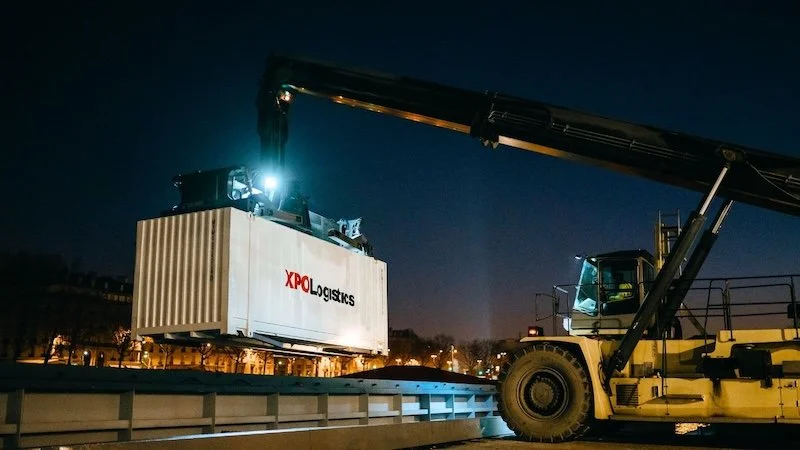Electrical retailer Currys finds itself in a sticky spot: RTIH presents the retail technology week in numbers
Do you like numbers? Do you like retail systems news? Then this is the article for you. Including Marks and Spencer, SumUp, LEGO Fortnite, Moonpig, dunnhumby, Aria, and Mollie.
£4.2 billion…Currys has reported half-year revenue of £4.2 billion, down 4% ignoring exchange rate impacts
Underlying operating profit increased from £29 million to £31 million. Net debt rose from £105 million to £129 million.
Aarin Chiekrie, Equity Analyst at Hargreaves Lansdown, says: “There’s no getting around it, Currys finds itself in a sticky spot. Consumers are simply struggling to justify as much discretionary spending on TVs and gadgets amidst a cost-of-living crisis, despite Christmas being just around the corner.”
“That’s led to a small decline on the top line, with like-for-like sales falling 4% in the first half. And in the Nordics region, the group’s second-largest segment, the market remains extremely tough. Almost all categories saw sales declines and inflationary cost pressures remain a force to be reckoned with.”
“While there’s no magic wand to fix all the headwinds, finding a new home for its Greek electronics retailer, Kotsovolos, should ease some of the pressure in the short-term.”
“The £156 million of net cash Currys expects from this sale will provide a welcome boost to the group’s balance sheet, as well as allow management to sharpen its focus on the remaining regions.”
“Currys’ services channels remain a beacon of light in these dark times. Its services typically have higher margins than goods sales, so can help to relieve some of the pressure of the group's falling revenues.”
“The focus now swings to the all important Christmas trading period. Santa delivered some strong growth for the domestic business in the last peak sales period, but it’s a tough ask to expect the same again this year.”
60%…Online marketplaces are increasingly the dominant method that consumers use to purchase products, representing c.60% of all e-commerce spend globally and transacting c.$4.1 trillion in annual gross merchandise value (GMV) in 2022, growing by $1.7 trillion since 2019.
New analysis by OC&C Strategy Consultants on digital spending found that specialist models (including vertical focused, secondhand and hyper-local models) have been a major driver of this growth, capturing business by targeting specific customer needs that generalist marketplaces have been unable to meet.
The findings were based on analysis of the top 250 digital marketplaces around the world by gross merchandise value (GMV) to understand the nature of these marketplaces and their evolution.
£1.08 million…Stamp Free, an AI powered digital post and shipping company, is gearing up for expansion after receiving £1.08 million from various investors and supporters.
Based in Edinburgh, the firm attracted equity investment led by Silicon Valley based R42.
Stamp Free also invited backing from equity crowdfunders, through the Seedrs platform, pulling in over 600 investors.
21%…A new report from Mollie highlights how spending and payment behaviour has shifted in light of growing inflation and the cost-of-living crisis. Despite economic challenges, nearly half of consumers believe the economic situation will improve in the short-term and expect to spend more in the next year.
The report is based on a survey of 5,000 e-commerce shoppers across Belgium, France, Germany, Netherlands and the UK.
Unsurprisingly, people are increasingly drawn to discounted items, with 38% indicating a higher likelihood of purchasing discounted products compared to a year ago. Additionally, 47% of UK consumers are more inclined to make online purchases if they are discounted.
Wider shopping habits are also shifting with only 1% of UK shoppers saying they haven’t changed their buying behaviour in the last year.
Social media, in particular, is playing a starring role, as 21% of Brits report being persuaded by content creators to make an online purchase - the highest in Europe. Only 1% of UK shoppers do not use social platforms for product research.
That is one of the key findings in a new report published by data science big hitter dunnhumby.
Entitled ‘The Power of Personalised Loyalty’, the report, authored by two of the company’s senior customer engagement experts, explores how leading retailers across the globe are harnessing intelligent ways to win and retain customer loyalty.
The study comprised a review of approaches to loyalty being adopted by 24 major retailers across EMEA, Latin America, North America, and the Asia-Pacific region.
It suggested that in a number of key areas of loyalty and personalisation, the reality around what is happening is not entirely in line with some common perceptions and reports in the media.
18…Carrefour Belgium has this week opened its smallest store in Belgium, measuring just 18 sqm.
Carrefour BuyBye is located at the retailer’s Belgian headquarters in Zaventem (near Brussels).
The autonomous store consists of a series of refrigerated vending machines where customers can purchase lunch, snacks, cold drinks and fruit.
Shoppers need to download the Carrefour Buybye app, create an account and add a payment method before they can use the app to open the machines, take out products and check-out.
Initially, this will be open Monday to Friday from 7am to 10pm to start with, but from January it will be available seven days a week.
It is the result of a collaboration with startup Reckon AI, which specialises in micro-stores equipped with artificial intelligence. Plans are afoot to roll-out the concept to Carrefour Belgium’s existing physical stores.
$1.3 million…Myth.AI has closed a $1.3 million funding round to help drive operations in the UK and explore new markets.
Founded in Turkey, the startup was originally created to help the founder’s own high-end fashion line Women & Women, but now offers a generative AI solution that uses visual or text prompts to streamline the design of new and unique patterns for brands across Europe.
The company claims that its technology drastically reduces the time is takes to create bespoke designs, along with helping to create a more sustainable design and production process through reducing the need for swatch samples, which ultimately end up in landfill.
Brands in the textile design industry such as Ratti (Italy), Telater (Spain), Sun Textile, Elyaf Textile, Gama Textile, Zorlu Textile, Halmer Fabric (Turkey) are deploying the technology, along with ceramic industry firm Vitra.
70 million…Marks & Spencer has donated 70 million meals to local charities with food redistribution partner Neighbourly.
Since the launch of the partnership in 2015, M&S has been working with Neighbourly to redistribute surplus food from store, which is too good to waste, to more than 3,000 local charities and community organisations.
To date, the tie up has supported over 4.5 million individuals, with meal donations supporting families in need, young people and those with disabilities.
It has prevented over 30,000 tonnes of good quality food from going to waste. This contributes to M&S’ ‘target of 100% of edible surplus food to be redistributed by 2025, as part of its ‘Plan A’ roadmap to net zero.
Alex Freudmann, Managing Director at M&S Food, comments: “Doing the right thing for the people and communities we serve has always been important to M&S, and that’s one of the reasons we launched our partnership with Neighbourly back in 2015.”
“I’m delighted that we have surpassed the milestone of 70 million meals donated because its enabled us not only to tackle food waste in our stores but also ensure our delicious food, which is too good to waste, can support those in need when they need it most. I want to thank our incredible store colleagues for their ongoing efforts to make this partnership such a success.”
€15 million…French FinTech startup Aria has announced a €15 million funding round to expand its deferred payment infrastructure across the platform economy and B2B marketplaces.
This was led by 13books Capital with participation from Adevinta Ventures, Ankaa Ventures, Otium Capital and angel investors including Laurent Ritter (Purple), Mark Ransford and Guillaume Princen (former Stripe exec).
Aria enables any merchant, B2B marketplace or vertical SaaS company that sells goods and services online and offline to offer their sellers a wide array of payment methods and terms, and get paid instantly — all in a single platform.
It is able to connect with B2B marketplaces, transactional SaaS platforms and ERP systems to distribute early payment of supplier invoices and offers deferred payment options for end-clients via its API.
51%…Research commissioned by enterprise customer data platform, Treasure Data, finds that 51% of UK consumers deliberately try to withhold their personal data from brands.
31% indicated they would prefer to remain completely anonymous from brands altogether. Yet 79% of senior executives in the UK believe their customers trust them with their personal data.
$306.6 million and $8.6 billion…British payments firm SumUp, has raised $306.6 million in a round of funding that values the company north of $8.6 billion.
Sixth Street Growth, the growth arm of global investment firm Sixth Street, led the investment, while existing existing backer Bain Capital Tech Opportunities, FinTech investment firm Fin Capital, and debt financing firm Liquidity Group, also participated.
SumUp plans to use the cash to organically launch more financial services — around the card readers and other Point of Sale tools, it offers the likes of invoicing, loyalty, and business accounts. It’s also looking to expand to more geographies beyond the 36 where it is currently active.
$2.3 million…Leav, a startup in the mobile self-checkout industry, has raised $2.3 million in seed funding, led by Exo10.vc, a venture capital fund steered by serial entrepreneur and investor Nicolas Bouchard, known for founding DuProprio in 1997.
The company’s technology allows customers to scan and pay for items using their mobile devices, eliminating checkout lines.
1…Moonpig says it is the first major online card retailer to launch an AI tool that helps people craft authentic heartfelt and personalised messages all with the click of a button.
It notes that, with the increased use of instant messaging via apps such as Whatsapp, Messenger and Instagram, over the last decade emojis have come to replace words when communicating with friends and family, and as a result left many struggling to write heartfelt messages to loved ones.
The new Smart Text feature is available across Moonpig’s entire range of cards, including Christmas.
It can be found in the editor toolbar as a magic symbol when starting to compose a message. It gives people the chance to type in a short prompt providing details about the recipient, occasion and even inside jokes or specific interests.
84…US-based Terrible’s is adding 84 of its gas stations to Upside’s digital marketplace.
It says that this partnership will help it access a broader audience and incentivise both new and occasional customers to choose their gas stations over competing options, thanks to personalised promotions within the Upside platform.
1…LEGO Fortnite is now live. This is the first play experience to come from a long-term partnership between Epic Games and the LEGO Group to develop fun and safe digital spaces for children and families.
New world building, gameplay features, and more LEGO Style Outfits will be arriving in updates starting early 2024. Fortnite is available to play for free on PlayStation4, PlayStation5, Xbox One, Xbox Series X|S, Nintendo Switch, PC on Epic Games Store and cloud-based gaming streaming services.
LEGO Fortnite is built inside Fortnite and powered by Unreal Engine 5, taking advantage of features such as Chaos physics and destruction to give players the ability to place, connect and break apart bricks just like they would in the real world.
The game utilises World Partition to stream all 95 square kilometres of playable space (that’s 19x the size of the Fortnite Battle Royale Island!), and uses the Procedural Content Generation (PCG) framework to dynamically create detailed environments.















Continue reading…